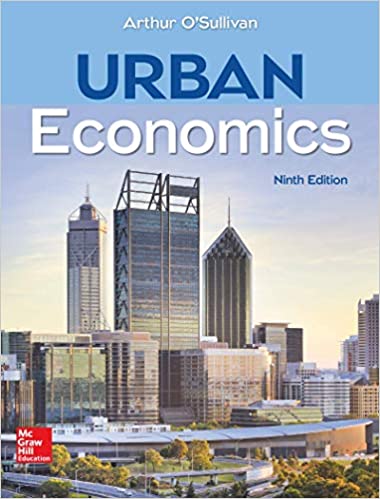Syllabus
| Description |
Learning Outcomes | Prerequisites | Grading | Academic Integrity |
General Student Conduct | Disability
Policy | Text |
The application of economic
analysis to urban and regional areas. Topics
include the theory underlying urbanization and
the location of economic activity, the
methodology utilized to analyze urban and
regional economies, and problems and policies
related to urban areas, such as housing, poverty,
transportation, crime, and local public finance.
Special attention will be given to the San Diego
metropolitan area.
Upon successful completion of this course, students should be
able to:
- show how basic economic
principles can be applied to the analysis
of urban phenomenon.
- understand the theory developed to
evaluate the impact of spatial
relationships.
- find of urban data and methods of data
analysis.
- analyze in economic terms
urban institutions such as the housing
market and local government.
- examine the economic basis
of urban problems and the policies
designed to solve them.
ECON 101 (Principles of
Microeconomics) - You should be familiar with
supply and demand analysis, production and cost
theory, and market structures. There is a review of
microeconomic principles in Chapters 2 and 24 of the text.
Grades will be based on the
following:
There will be two tests
(each worth 20% of your grade) during the
semester and a final exam (30%). Each test
will consist of short
answer, problem, and graphing questions. If you miss a test
during the semester and have a written excuse, you have two
options: (1) You can take a makeup test during the
class period immediately following the scheduled test, or
(2) the weight of the other exams will be increased
appropriately, with the difficulty of each exam factored in.
The final must be taken at the date and time
scheduled, so please be sure there are no conflicts.
The research paper allows you to develop
in-depth knowledge of a particular aspect of
urban economics. The paper can be an individual or a
team effort. The approximate length of the
paper should be 8 - 10 pages for individual
efforts, more for group projects. Footnotes
and a bibliography should be included.
There will be two short written
assignments. One will require you to employ a method
of economic analysis appropriate to analyzing regional
economies. The other will require
you to gather and analyze data from some of the basic sources
of urban economic data.
There will be ample
opportunities to earn extra credit in the
class.
Ethical behavior is expected at all times.
From the Undergraduate Bulletin: "Academic
dishonesty is an affront to the integrity of
scholarship at USD an a threat to the quality of
learning. . . Violations of academic integrity
include: a) unauthorized assistance on an
examination; b) falsification or invention of
data; c) unauthorized collaboration on an
academic exercise; d) plagiarism; e)
misappropriation of research materials; f) any
unauthorized access to an instructor's files or
computer account; or g) any other serious
violation of academic integrity as established by
the instructor. An act of dishonesty can lead to
penalties in a course such as reduction of grade;
withdrawal from the course; a requirement that
all or part of a course be retaken; and a
requirement that additional work be undertaken in
connection with the course."
The University of San Diego School of Business expects its
students to conduct themselves in a professional manner at all
times. Its students
are generally men and women who are preparing for career
employment. An integral part of their career and professional
development is the expectation that they will conduct themselves
during the educational processes in the same manner as will be
expected in an employment situation.
The University of San Diego Student Code of Rights and
Responsibilities is published online at
www.sandiego.edu/archways.
It is University of San Diego policy not to
discriminate against qualified students with a documented
disability in its educational programs, activities or services.
If you have a disability-related need for accommodations
in this class, contact the Student Affairs office for
assistance.
|


